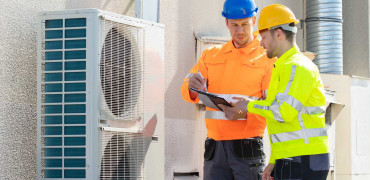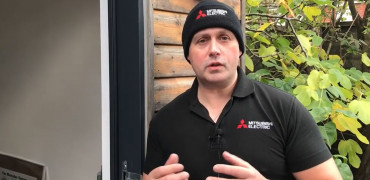If you’ve been following the news recently, one of the main topics of conversation beyond politics, is how we replace carbon-intensive gas to heat our buildings – something we must do if we are ever to get to the legally-binding target of Net Zero by 2050.
Many are suggesting the use of hydrogen which means we could possibly carry on using the existing gas network and avoid the disruption of removing gas boilers from people’s homes.
For me though, this is a false economy as hydrogen remains unproven on such a grand scale. There are also other industries and sectors where the use of hydrogen will have a much greater impact on carbon reduction, such as shipping, manufacturing and agriculture.
The grid has also got ‘greener and greener’ as more solar, wind and nuclear power replaces coal and gas for electricity production.
So personally, I think society needs to ‘grasp the nettle’ and realise that we are now in the electric age and so the future is electric – and that includes how we heat our homes.
We need to replace the million plus gas boilers installed a year so there is real opportunity here
A real opportunity for growth
And this is where I see a real opportunity for the engineers that visit our training courses, as they are the experts in how to apply electric heat pumps into homes and properties.
Whether that is air to air, or air to water, or a mixture of both, this is the future of heating for the UK.
So, whether you are a heating engineer or an air conditioning engineer, the future offers serious opportunities for you and your unique skills.
It’s true that there is work that needs to be done on many properties to improve their thermal efficiency before the full benefits of heat pumps can be realised. That is likely to require government intervention to incentivise homeowners to upgrade their insulation levels and stop the draughty leaks.
However, that still leaves millions of homes and other buildings that have been built or improved since the 1980’s that are ready now to capitalise on the installation of a heat pump.
Other opportunities
Firstly, the past two years of the pandemic, coupled with hotter summers has seen an increase in home air conditioning, whether inside the house or in dedicated ‘garden offices’.
Secondly, as I realised the other day, I’d been thinking that the government’s target of installing 600,000 heat pumps a year meant 600,000 individual homes.
Now though, there are so many town centre buildings being reinvented as mixed-use, with apartments above shops, offices and gyms, that there is now the real potential of using localised heat networks to share energy around a building, or an entire community.
And this is where air conditioning skills come in, as heat pumps can be linked to a 4th or 5th generation heat network to take waste heat from, say a gym, or IT Cooling room, and re-use it for apartments above.
Learning new skills
So the engineers coming through our online or face to face courses and learning or reminding themselves of the skills necessary to capitalise on what will quickly grow to be a real opportunity. Remember, we still currently install over one million gas boilers a year. In the main, these will be replaced with heat pumps.
I think that is why we have seen an increase in the number of gas and oil heating engineers joining our courses recently as they realise that they need to retrain for the age of electric heating.
And they are very welcome.
After all, we all need to work together if we are to reverse the worst effects of the climate crisis, so, the more the merrier!
If you’d like to know more about the benefits of heat pumps and the future of electric heating, visit our Training page to see which course would suit you.
Ben Bartle-Ross is a technical trainer at Mitsubishi Electric



